The driveways and barns and garages, the stairways and trees of the Whitney estate at West Chop have, for the past several years, been the scene of a new type of activity. A special project has been underway under the direction of Miss Kathleen Hinni of the Summer School of Creative Arts, and young people have been learning to grow through the arts.
Founded with the idea that, among other things, children develop more rapid socially if they create, and create together, the Hinni School lays emphasis upon drama, modern dance, music, and ballet in daily classes under the direction of specialized instructors.
Visited on Tuesday, the school, which was preparing to close in another two days, should have been in a state of considerable disrepair and upset. Far from it, through, students and teachers alike were eagerly taking part in their activities.
A Bevy of Industry
One group was engaged in modern dance in the barn, another was working on drawings inspired by two lines that they had been given, and a third listened to the life of Schubert and then to a series of records by him. Seated peacefully on the floor, music students seemed completely enthralled by the pieces to which they were listening. Every once in awhile one would begin practicing a dance movement of beating out rhythms with a hand or a leg.
The comment was made once that “We did that dance,” and queries were directed to the teacher as to further events in the life of the composer. The music reached a certain intensity and a child looked up eagerly. “Now he’s got black hair and glasses and can play the piano.”
But then the activity was interrupted. A group of leotard clad dancers appeared in the doorway and the first music class was disbanded. Several of its members were noted in the yard later, busily engaged in a game of kick the can with their swimming instructors.
Art students who, this year, “are all out for African motifs,” according to their teacher, were in the process of deciding what names to call their creations. One child seemed distressed by the fact that her bird, a duck she thought that it probably was, was going to be called simply A Duck. She felt that it should have a more original name, particularly if, as some of her classmates suggested, “it was part chicken anyway”.
Because the inter-relationship of the arts is stressed at Miss Hinni’s, many children’s projects show signs of the work that they have been doing in other areas. The Devil and the Deep Blue Sea, a painting of Satan riding through waves, had lines that had obviously been inspired by dance movements.
The climax of the morning’s activities was a theatre class which all students attended together. Practice for the day consisted largely of training in the actor’s walk, in falling and rising like lead, and then in creating their own movements to suggest certain feelings.
Meanwhile, outside, activity of a less artistic nature went on while two of the younger day students considered what they would like to do and what they would not. Both had just finished their dance class and apparently had not cared to be interrupted by a displacement by older students of drama.
“I want to dance,” was one’s comment.
“No, let’s gallop.”
“But you can’t gallop without your shoes on,” a counselor added hopefully.
“Don’t you know horses all wear shoes?”
Silence followed that for a moment.
Then, “I want my teddy bear,” and even though the bear was peacefully watching the drama proceedings inside, nothing would suffice but that he, too, join the horses on the outside.
Concluding their dramatic interpretations was a rehearsal for the dance Madeleine which was to be presented along with a puppet show that afternoon. Madeleine, based on the cartoon which has recently been appearing in magazines and newspapers, showed the girl on her trio to the coronation, being rushed to the hospital with appendicitis, and going through the various other activities while her fellows looked on.
A Pause After Drum Beating
Then it was lunch time. There must be rest and preparation for the afternoon’s show. Miss Hinni herself, pausing after the drum beating that had accompanied the student interpretation of Madeleine, spoke a bit more of her work with the children and what it was that she was trying to get them to do. Many , she explained, come certain that there is nothing that they can make along artistic lines. They are sure that they will never draw, that of course it is impossible to dance or to sing, but before long, seeing other children dancing and singing, they begin on creations of their own. There have been numerous musical pieces composed this summer, a variety of dances, and several poems.
“There were two whom one mother brought rather skeptically last season,” Miss Hinni explained. “We called them the Television Two. Their mother insisted that they could not possibly live without television. I said that they could. Of course, once they came here there was no question of that or of comic books. Children must learn that what they have to say is important, too. They must be made to understand that. It is one of the basic precepts on which we work.”

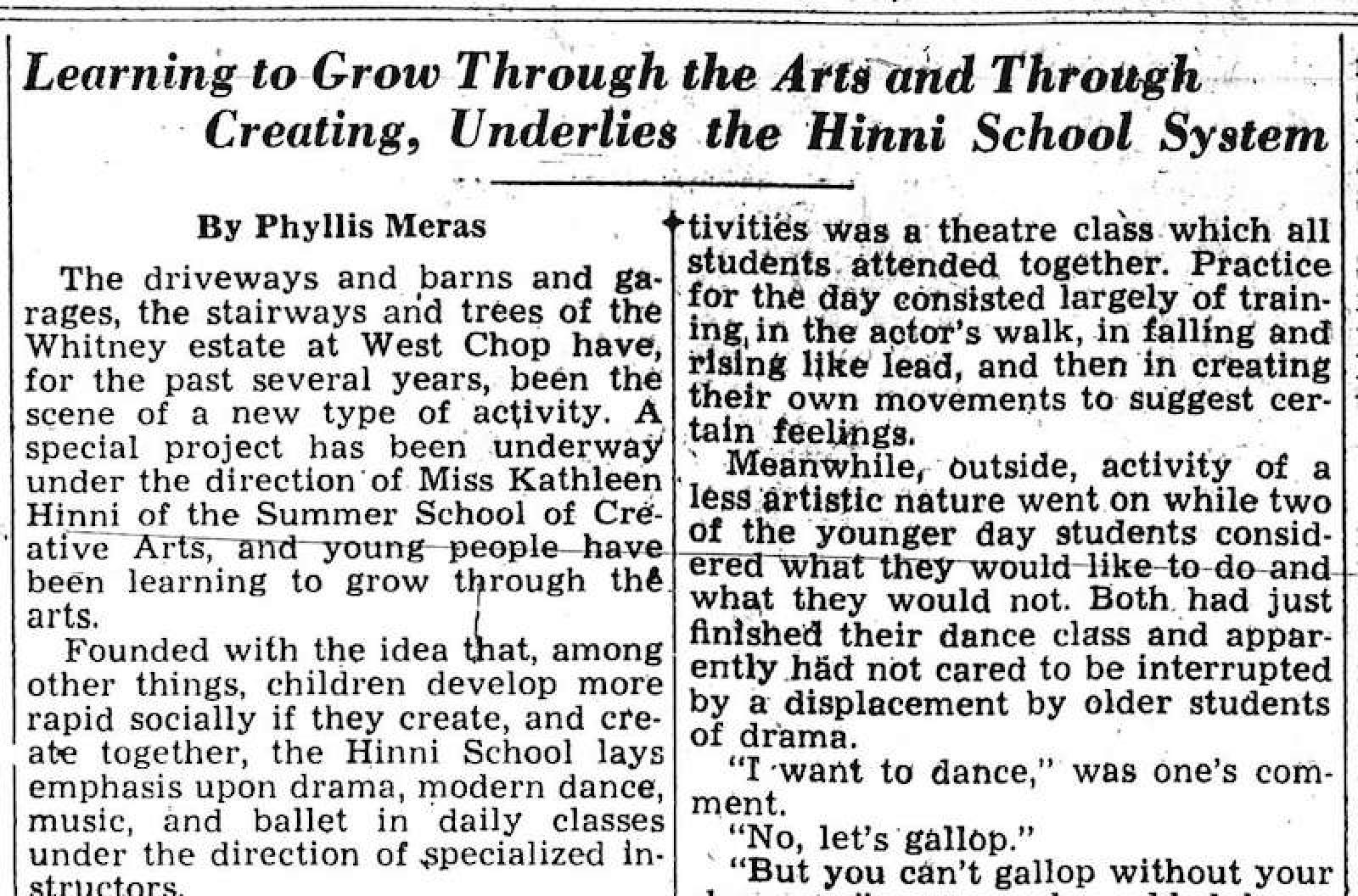



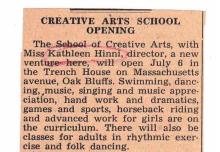
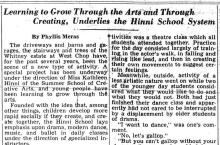
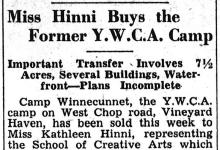

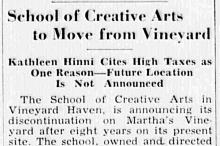
Comments